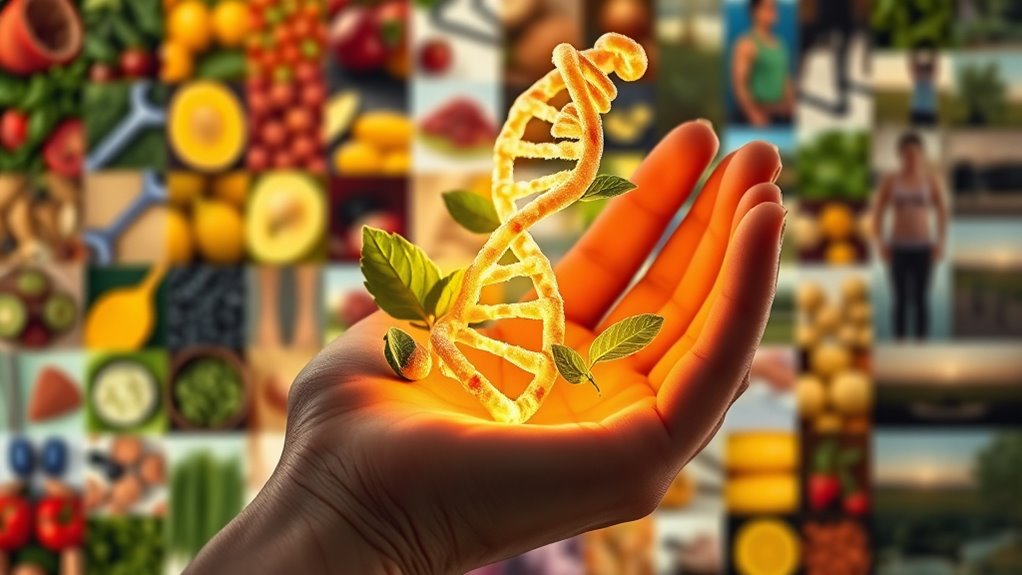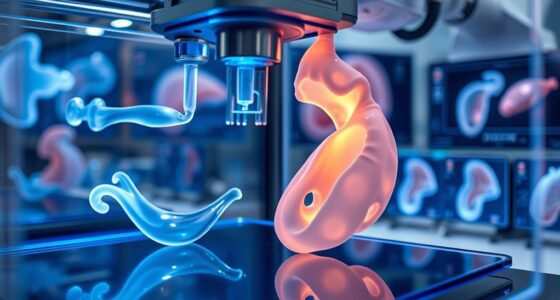Your lifestyle choices directly shape your gene expression through epigenetic mechanisms like DNA methylation and histone modification. Eating healthy, exercising regularly, managing stress, and getting enough sleep can activate beneficial genes and silence harmful ones. Conversely, exposure to pollutants or chronic stress can negatively influence your DNA. These changes aren’t permanent; they can be reversed or strengthened over time. Keep exploring to understand how small habits can have a big impact on your health and longevity.
Key Takeaways
- Lifestyle choices like diet, exercise, and stress management can modify gene activity through epigenetic mechanisms.
- Environmental exposures such as pollution and toxins influence DNA methylation and histone modifications, affecting gene expression.
- Regular physical activity promotes beneficial epigenetic changes linked to metabolic health and aging.
- Chronic stress and poor sleep can lead to epigenetic shifts associated with health risks and disease susceptibility.
- Many epigenetic modifications are reversible, empowering individuals to improve health through mindful lifestyle adjustments.

Have you ever wondered how your daily habits and environment can influence your genes? The fascinating field of epigenetics explores exactly that—how gene expression can be altered without changing your DNA sequence. These changes are often driven by environmental influences, which can turn genes on or off, impacting your health, aging, and even your susceptibility to diseases. Your lifestyle choices, from what you eat to how much you exercise, play a pivotal role in shaping these epigenetic modifications. This process is a form of genetic adaptation, allowing your body to respond to external factors in real-time, without altering your underlying genetic code.
Your daily habits and environment can shape your genes through epigenetics, influencing health and aging.
When you’re exposed to different environmental influences—be it pollution, stress, diet, or toxins—your body responds by modifying the way genes are expressed through mechanisms like DNA methylation and histone modification. For example, a nutrient-rich diet can promote beneficial epigenetic changes that support healthy cell function, while exposure to harmful substances might suppress genes involved in detoxification or immune response. These modifications can be temporary or long-lasting, sometimes even passed down to future generations, illustrating how your environment can influence not only your own physiology but also your lineage.
Your lifestyle choices serve as powerful tools for genetic adaptation. Regular physical activity, for instance, can lead to epigenetic changes associated with improved metabolic health and reduced inflammation. Conversely, chronic stress or poor sleep can trigger epigenetic shifts linked to increased risk of depression, cardiovascular issues, or immune suppression. Additionally, adopting vertical storage solutions and organizing your space can reduce clutter-related stress, contributing to a healthier mental state. What’s remarkable is that these changes are often reversible; by modifying your environment and habits, you can influence gene expression in a positive direction. This highlights the potential of epigenetics as a dynamic interface between your genes and your lifestyle, emphasizing that you’re not entirely at the mercy of your inherited DNA.
Understanding how environmental influences drive genetic adaptation underscores the importance of mindful living. Small changes—such as eating more vegetables, reducing exposure to pollutants, managing stress, or getting adequate sleep—can have profound effects on how your genes are expressed. These epigenetic modifications, shaped by your environment and habits, ultimately determine many aspects of your health and longevity. Recognizing that your lifestyle can influence your gene expression empowers you to make informed choices, knowing that your actions today can have lasting effects on your biological makeup and future well-being.
Frequently Asked Questions
Can Epigenetic Changes Be Passed Down Through Generations?
Yes, epigenetic changes can be passed down through generations. These heritable modifications, known as transgenerational inheritance, allow certain gene expression patterns influenced by lifestyle factors to persist beyond your lifetime. When you alter your environment or habits, you may trigger epigenetic marks that influence your descendants’ health. This means your choices can have a lasting impact, potentially affecting your children and grandchildren through inherited epigenetic modifications.
How Quickly Can Lifestyle Modifications Affect Gene Expression?
Imagine flipping a switch—lifestyle changes can influence gene expression surprisingly fast. The timing of epigenetic changes varies; some effects, like diet adjustments, can alter gene activity within days or weeks, showing the immediacy of lifestyle impacts. Regular exercise, for example, can rapidly modify DNA methylation patterns, demonstrating that your choices can swiftly shape your genetic expression and overall health, making change both powerful and immediate.
Are There Specific Diets That Promote Healthy Epigenetic Patterns?
Yes, you can adopt specific dietary interventions that promote healthy epigenetic patterns. Focus on nutritional patterns rich in fruits, vegetables, whole grains, and omega-3 fatty acids, which provide antioxidants and anti-inflammatory compounds supporting beneficial gene expression. By making mindful dietary choices, you influence your epigenome, potentially reducing disease risk and enhancing overall health. Consistent nutritional patterns can lead to lasting positive effects on your gene regulation over time.
What Role Does Stress Play in Epigenetic Regulation?
Stress impacts your epigenetic markers by altering how genes are expressed, often leading to negative health effects. When you’re under chronic stress, it can cause chemical changes that turn certain genes on or off, affecting your body’s functions. These epigenetic modifications can be passed down or influence disease risk. Managing stress through relaxation techniques and healthy habits helps protect your epigenetic stability, promoting better overall health.
Can Epigenetics Explain Individual Differences in Disease Risk?
Yes, epigenetics can explain individual differences in disease risk through gene-environment interactions. You might have unique epigenetic biomarkers that reflect how your lifestyle influences gene expression, affecting your susceptibility to certain diseases. Environmental factors like diet, stress, and exposure to toxins can modify these biomarkers, leading to variations in health outcomes. Understanding these interactions helps personalize prevention and treatment strategies based on your specific epigenetic profile.
Conclusion
Think of your lifestyle as the brush and your genes as the canvas. Every choice you make—what you eat, how you move, the stress you carry—paints strokes that shape your biological masterpiece. These epigenetic signals act as the artist’s touch, altering patterns and colors unseen but impactful. Remember, you hold the brush; your daily habits are the colors that can brighten or dim your genetic portrait, shaping your health’s future with every stroke.









